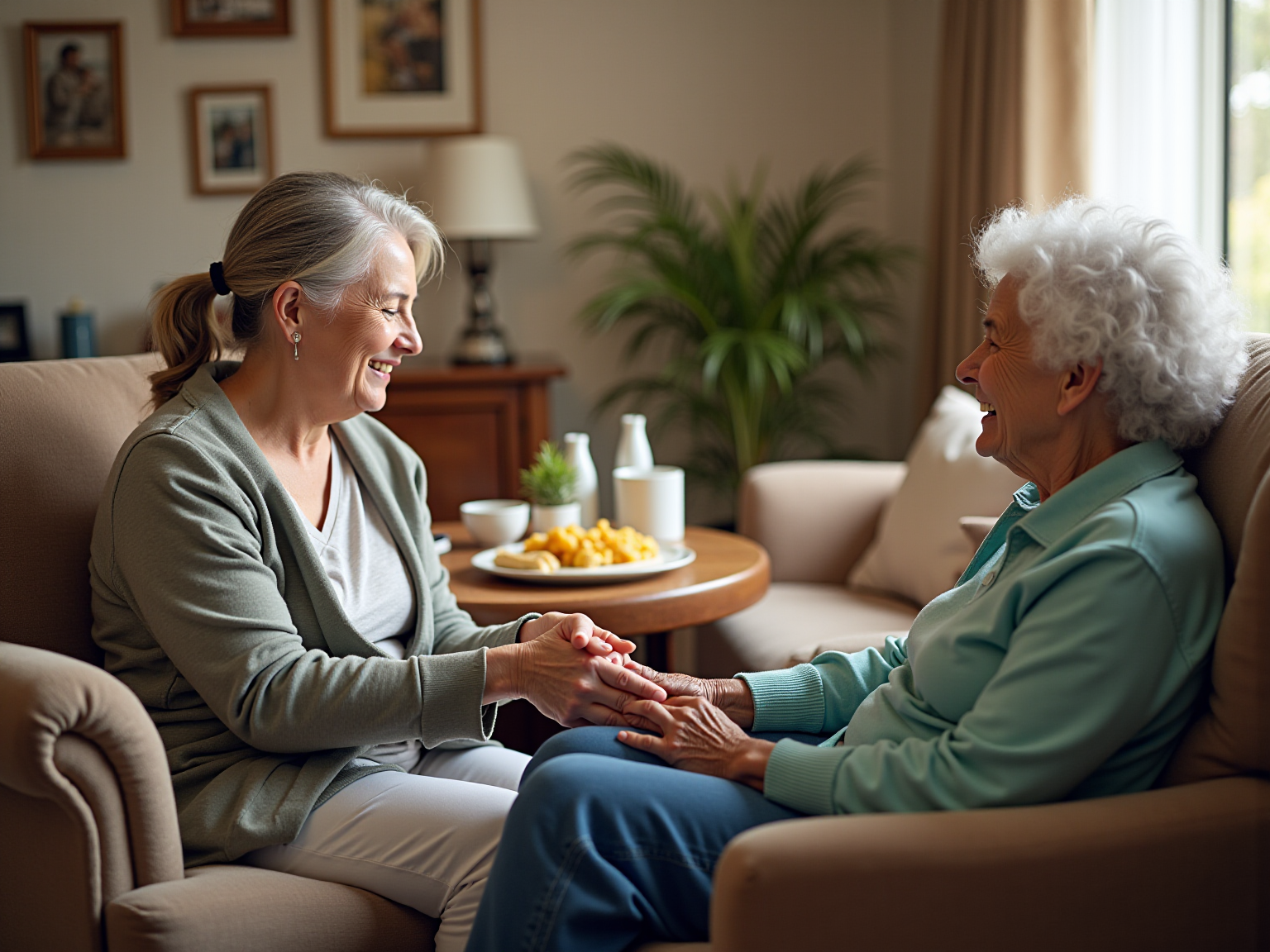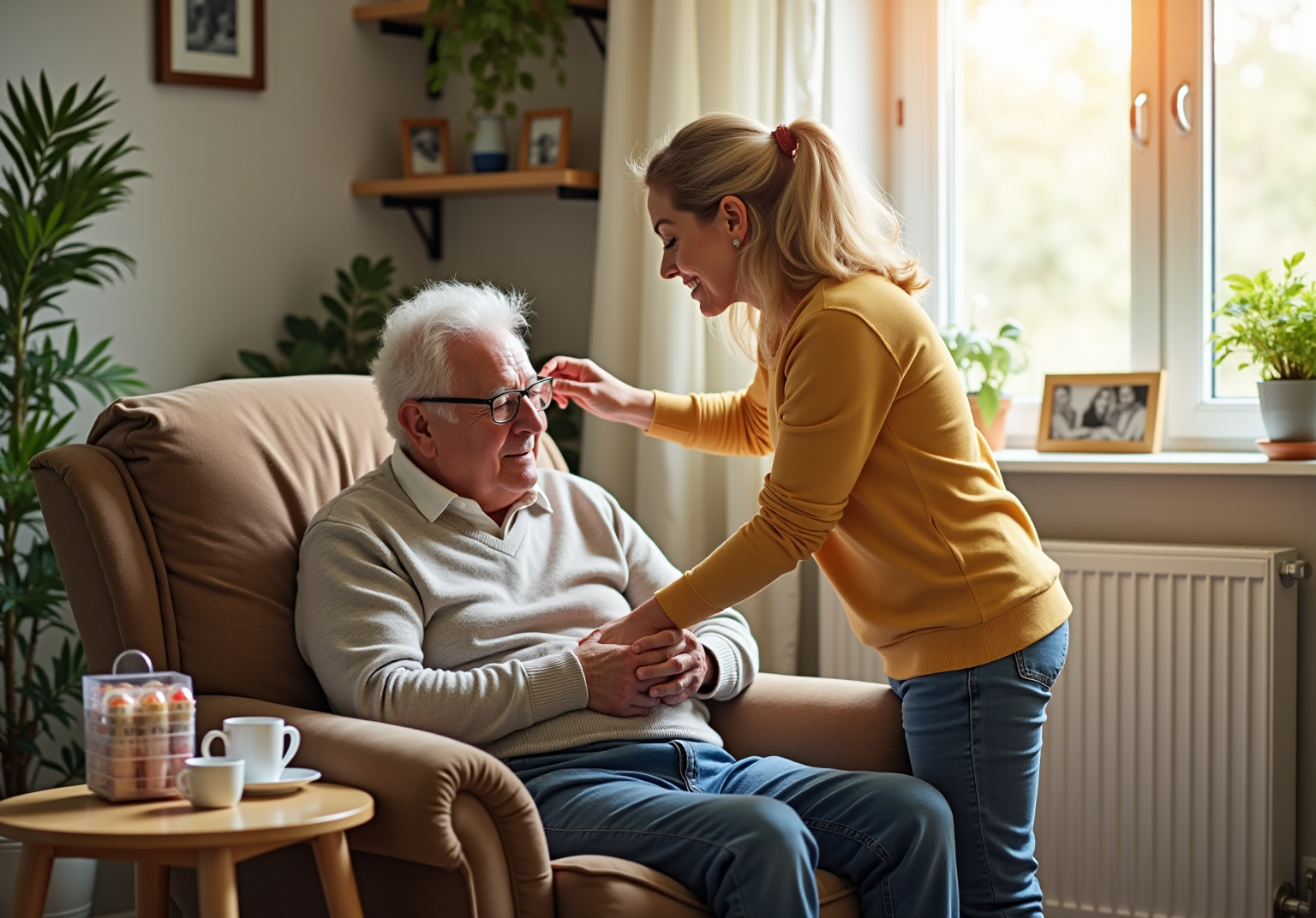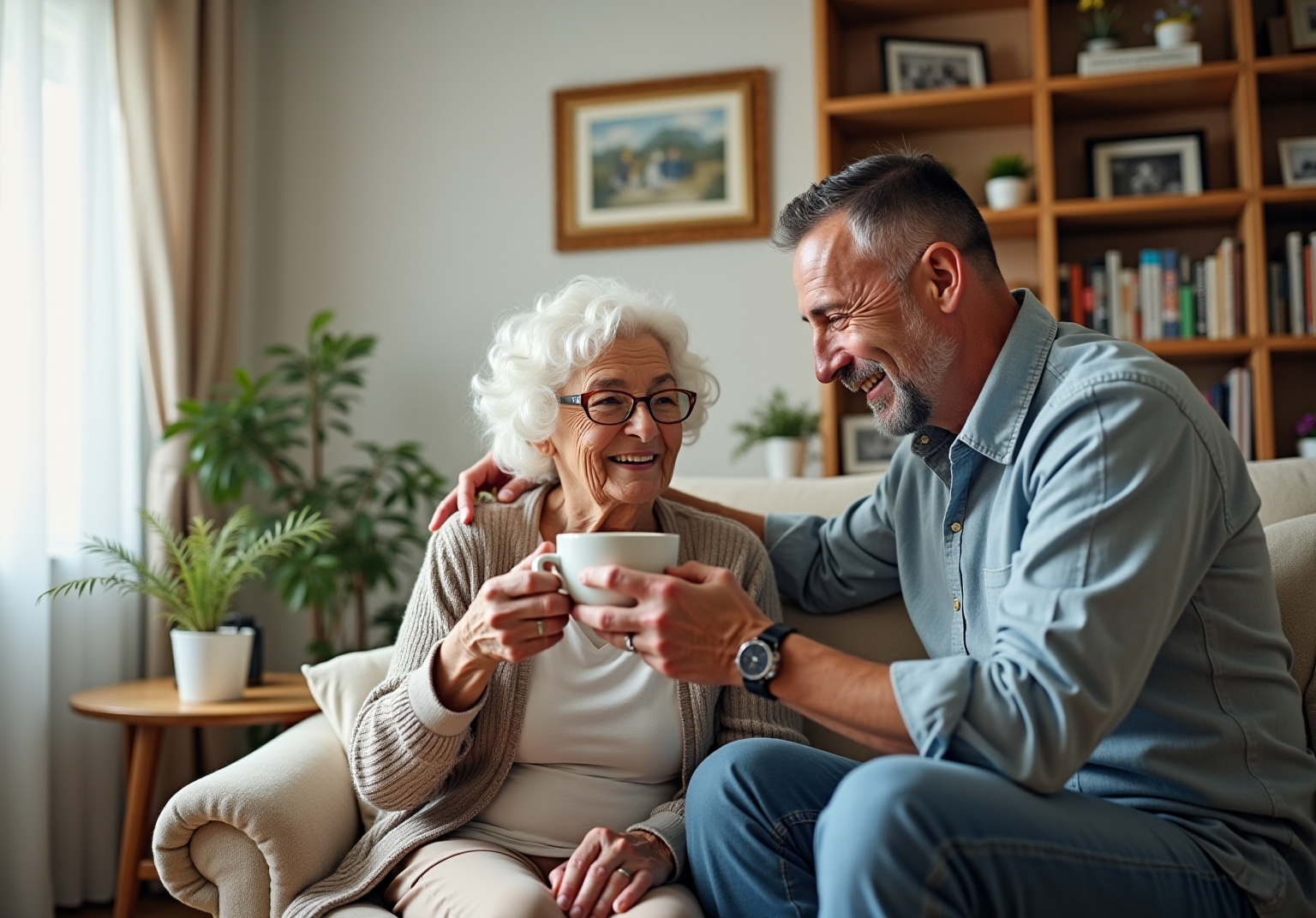Overview
In-home caregivers for the elderly are here to provide essential support, allowing seniors to maintain their independence and quality of life. Imagine the comfort of receiving personalized assistance with daily activities, tailored to individual needs. These caregivers not only help with physical tasks, such as bathing and meal preparation, but also offer emotional companionship—an invaluable aspect of well-being for elderly individuals. As the demand for such services continues to rise with our aging population, it’s more important than ever to recognize the profound impact these caregivers have.
In addition to physical support, emotional companionship plays a crucial role in enhancing the lives of seniors. It’s about more than just tasks; it’s about building relationships and ensuring that no one feels alone. We understand the concerns families face when seeking care for their loved ones, and we want to reassure you that compassionate care is within reach. Your comfort and peace of mind are our priority, and we’re here for you.
As a result, choosing the right caregiver can make a significant difference in your loved one’s life. With the right support, seniors can thrive, enjoying their daily routines with dignity and joy. Let us help you navigate this journey with confidence, ensuring that your loved one receives the care they deserve. Together, we can create an environment that fosters independence and emotional well-being.
Introduction
As our loved ones age, the need for in-home caregiving services is growing rapidly, underscoring the vital role these services play in enriching seniors’ lives. In-home caregiving provides a unique blend of personalized support, enabling elderly individuals to retain their independence while receiving the assistance they require in the comforting surroundings of their own homes. From daily tasks like meal preparation and medication management to offering companionship, these dedicated caregivers address not only the physical needs of seniors but also help alleviate feelings of loneliness and isolation.
With an increasing awareness of the benefits of in-home care, families are recognizing its value as a compassionate alternative to traditional nursing facilities. This article explores the significance of in-home caregiving, the variety of services available, and important considerations for choosing the right caregiver to ensure the well-being of your loved ones. We’re here for you, and your comfort is our priority.
Understand In-Home Caregiving: Definition and Importance
In-home caregivers for the elderly provide customized support services, allowing senior citizens to thrive in the comfort of their own homes. This essential support not only helps seniors maintain their independence but also assists them with daily activities such as:
- Bathing
- Dressing
- Meal preparation
- Medication management
- Companionship
The significance of in-home assistance lies in its ability to offer personalized care that caters to the unique needs of each individual, promoting safe and comfortable aging at home.
At Best Nurses Registry, we understand that home health services are not only more affordable and convenient than traditional nursing homes, but they also deliver the same level of effectiveness. Our compassionate support staff are dedicated to ensuring the safety and well-being of your loved ones, alleviating the ongoing worry and guilt that family members often feel. Recent studies indicate that as the baby boomer generation ages, the demand for in-home support services is expected to rise, highlighting the urgent need for expanded eldercare resources. Additionally, one in three adults aged 50-80 report feelings of loneliness, underscoring the vital role of emotional support and social engagement in home assistance services.
By offering personalized support, in-home caregivers not only enhance the quality of life for elderly individuals but also ease the burden on family members who may struggle to provide adequate assistance. For instance, a case study revealed that an elderly individual receiving tailored support experienced improved emotional well-being and a greater sense of independence, enabling them to flourish in their familiar surroundings. Furthermore, the AARP notes that the cost per visit for home health care ranges from $132 to $230, emphasizing the financial considerations families must navigate.
Moreover, at Best Care Nurses Registry, we take pride in our pet-friendly approach, recognizing that pets can significantly contribute to the emotional support of seniors. Our caregivers are trained to provide not only physical assistance but also companionship, ensuring that your loved ones feel valued and cared for.
To hear from our satisfied clients, consider the testimonials that showcase the positive experiences with our services. Our team members, including Brianna, Lucinda, and Sherie, bring a wealth of experience and compassion to their roles, guaranteeing that every client receives the highest quality support. Ultimately, the benefits of in-home caregivers for the elderly extend beyond physical assistance, fostering emotional well-being and independence for these individuals. If you’re ready to explore how we can assist you or your loved one, call us today at (888) 203-2529 to schedule a consultation.
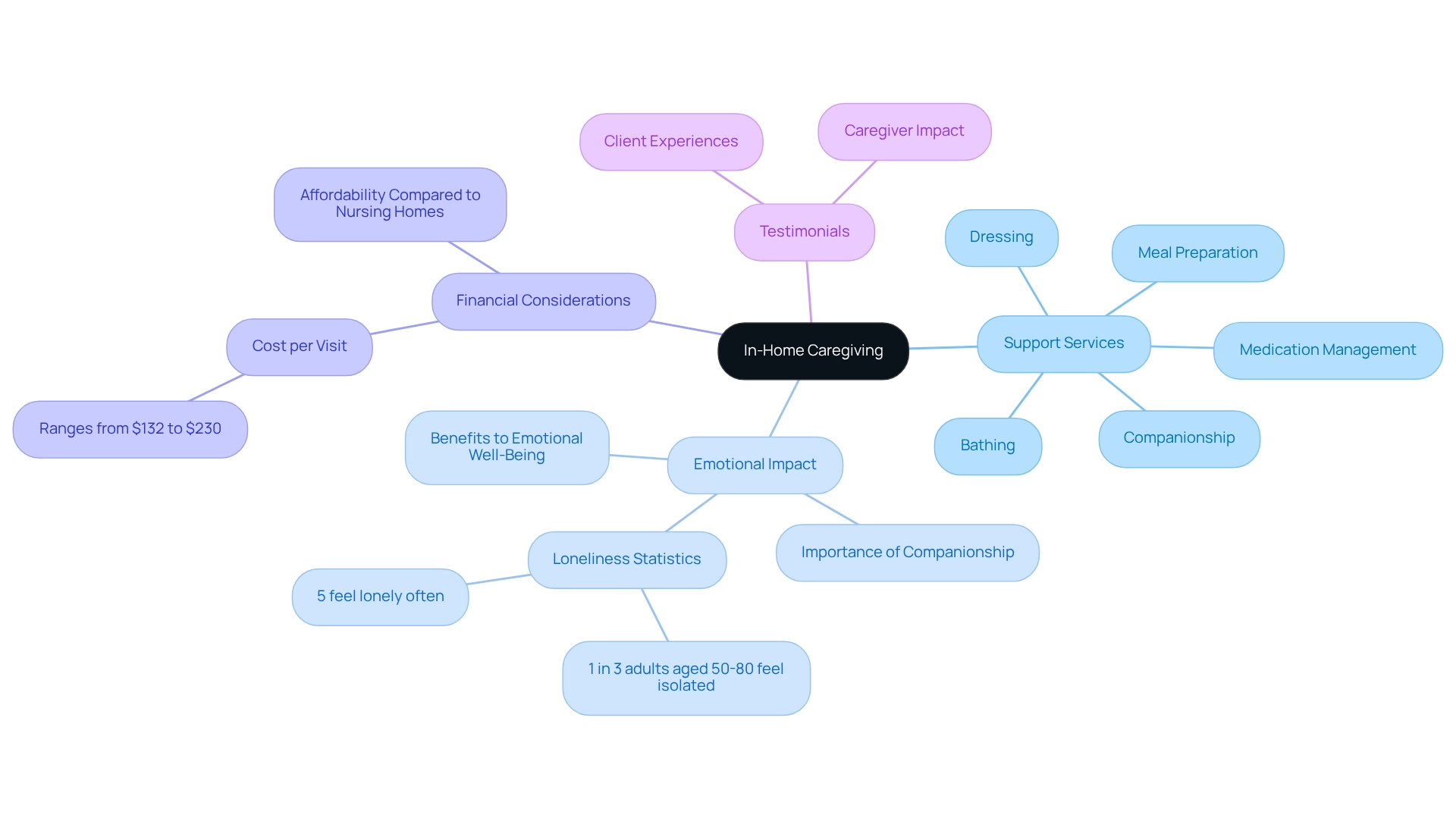
Explore Services Provided by In-Home Caregivers
In-home caregivers for the elderly provide a comprehensive range of services tailored to meet the specific needs of elderly individuals, all at a reasonable cost. These services typically encompass:
- Personal Care: Assistance with activities of daily living (ADLs) such as bathing, grooming, dressing, and toileting, ensuring seniors maintain their dignity and hygiene.
- Companionship: Involving older adults in meaningful conversations and activities to combat loneliness and promote mental well-being, which is crucial for emotional health. Caregivers provide essential emotional support, alleviating feelings of isolation and contributing to overall mental wellness.
- Meal Preparation: Organizing and creating healthy meals that accommodate dietary limitations and choices, including seasonal menu planning to guarantee fresh ingredients throughout the year, assisting older adults in sustaining a balanced diet and preventing inadequate nutrition.
- Medication Management: Ensuring that elderly individuals follow their medication schedules, including reminders and assistance with administration, which is vital for their health and can prevent adverse health effects.
- Light Housekeeping: Helping with domestic chores like laundry, cleaning, and grocery shopping, enabling elderly individuals to reside in a neat and secure setting, minimizing household risks that might result in accidents.
- Transportation: Providing rides to medical appointments, social events, or errands, facilitating independence and access to necessary services, which is crucial for maintaining an active lifestyle.
- Specialized Care: Offering support for specific health conditions, such as dementia, arthritis, or mobility issues, through trained caregivers who understand the complexities of these challenges.
These services are intended to greatly improve the quality of life for seniors through in-home caregivers, allowing them to stay in their homes while receiving the necessary support they require. Families can have peace of mind knowing that their loved ones are receiving compassionate support from trained professionals. With a Yelp rating of 4.0, families have expressed appreciation for the support offered, emphasizing the positive influence on their loved individuals’ well-being. As Margaret S. wisely noted, “Take comfort in knowing you don’t need to fill up the silence to have a visit be meaningful,” reflecting the essence of companionship in caregiving. Customized support strategies are designed to meet unique requirements, guaranteeing that every elderly person gets individualized assistance that promotes autonomy and ease. Moreover, case studies have demonstrated that families who use in-home caregivers report significant enhancements in their loved ones’ emotional and physical well-being, further emphasizing the importance of these essential services.
To learn more about how Best Care Nurses Registry can assist you or to schedule a consultation, please call (888) 203-2529.
Recognize the Benefits of In-Home Care for Seniors and Families
In-home caregivers for the elderly offer a wealth of advantages for both seniors and their families, making this option a comforting choice for those in need of support. Let’s explore some key benefits that resonate deeply with many families:
- Independence: Imagine your loved one maintaining their independence while surrounded by the warmth of familiar surroundings. This sense of autonomy is crucial for emotional well-being, contributing to a higher quality of life. It allows seniors to engage in daily routines and activities they cherish, fostering joy in their lives.
- Personalized Care: Each care plan is thoughtfully tailored to meet the unique needs and preferences of the individual. This level of personalization not only ensures appropriate support but also promotes dignity and respect for the elder’s lifestyle choices, enhancing their happiness at home.
- Cost-Effectiveness: In-home assistance often proves to be a more affordable option compared to assisted living facilities or nursing homes. With flexible support hours and no minimum requirements, families can choose services that align with their budget and needs, providing peace of mind.
- Family Involvement: Families can remain actively engaged in their loved one’s care, strengthening bonds and fostering reassurance. This involvement is vital; over 80% of family support providers indicate that their loved ones’ preferences are prioritized in treatment plans, leading to greater satisfaction with the assistance received.
- Enhanced Health Results: Research indicates that elderly individuals receiving in-home assistance often experience improved health outcomes, including up to a 25% reduction in hospital readmissions for certain chronic conditions and faster recovery times. With 70% of home assistance recipients aged 65 and above, the demand for these services is on the rise, highlighting their importance.
- Emotional Support: Caregivers not only provide essential assistance but also companionship and emotional encouragement, significantly enhancing the quality of life for older adults. Their presence can alleviate feelings of loneliness and isolation, which are all too common among seniors. Additionally, these caregivers foster invaluable social connections, improving both mental and physical health.
These compelling benefits make in-home caregivers for the elderly a viable and often preferred option for families seeking to support their aging loved ones. We’re here to ensure they receive compassionate and effective care in the comfort of their own homes.
Select the Right In-Home Caregiver: Key Considerations and Tips
Choosing the right in-home caregivers for the elderly is essential for ensuring the well-being of your loved ones. This decision can feel overwhelming, but understanding the key considerations can help guide families through this important process.
- Assess Needs: Begin by evaluating your loved one’s specific needs. Consider their medical requirements, personal preferences, and daily activities that require assistance. Indicators such as difficulty with personal hygiene, dressing, cooking, and managing medications can signal the need for support services. Grasping these elements is crucial for finding the right attendant.
- Research Options: Look for trustworthy home support organizations or independent helpers who come highly recommended. Check their qualifications and experience to ensure they meet the required standards of service. CNAs (Certified Nursing Assistants) typically have extensive training in medical procedures, while HHAs (Home Health Aides) focus on personal support and daily living tasks.
- Interview Candidates: Conduct interviews with prospective support workers to assess their suitability for your loved one. Ask about their experience, caregiving philosophy, and availability to ensure alignment with your family’s needs. Open communication with the provider is vital for ensuring quality care.
- Check References: Request references from previous clients or employers to gain insights into the provider’s reliability and quality of care. This step can offer reassurance regarding their abilities and help address any concerns you may have.
- Trial Period: Consider introducing a trial period to observe the interaction between the support person and your loved one. This approach allows families to assess compatibility before making a long-term commitment. Regular check-ins can help monitor the provider’s performance and your loved one’s satisfaction.
- Involve Family: Engage family members in the decision-making process to ensure everyone feels comfortable with the selected aide. Addressing concerns collectively can foster a supportive environment for both the provider and the client.
With approximately 14 million Americans over 80, the demand for in-home caregivers is significant. Additionally, the economic value of unpaid assistance provided by family supporters is estimated at $600 billion annually, highlighting the importance of informed choices in selecting helpers. Moreover, with one in four adults over the age of 65 experiencing a fall each year, choosing a qualified provider can help reduce such risks.
Without CNA/HHA services, seniors may face several risks, including health decline due to lack of medical monitoring, poor nutrition from inadequate meal preparation, and social isolation that can lead to depression. By following these guidelines, families can improve their chances of finding a provider who not only meets their loved one’s needs but also fosters a positive and trusting caregiving relationship. The challenges faced by caregivers, as noted in recent legislative discussions, underscore the necessity of choosing caregivers who are equipped to navigate these issues effectively.
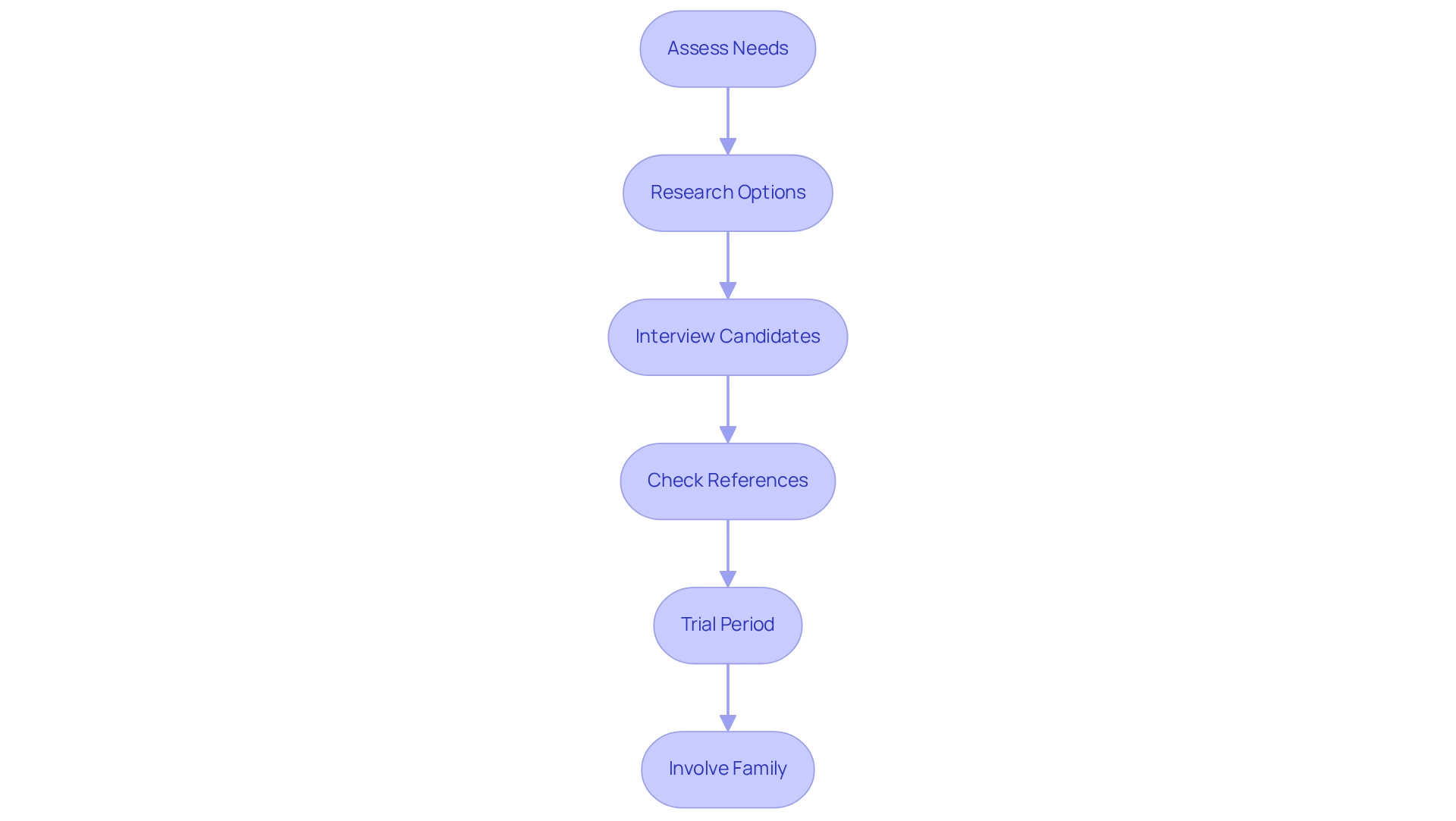
Conclusion
In-home caregiving is a vital service that supports our growing elderly population, offering personalized assistance while allowing them to maintain their independence in the comfort of their own homes. The diverse range of services provided by in-home caregivers—such as personal care, companionship, meal preparation, and medication management—addresses both the physical and emotional needs of seniors. This holistic approach not only enhances the quality of life for elderly individuals but also alleviates the burdens often experienced by family caregivers.
The advantages of in-home care extend beyond mere convenience and affordability. Families benefit from the emotional support and companionship that caregivers provide, which is crucial in combating feelings of isolation among seniors. Additionally, the ability to customize care plans ensures that each senior receives the attention and assistance tailored to their specific needs, fostering a sense of dignity and respect in their daily lives.
Selecting the right caregiver is a critical step in ensuring the well-being of elderly loved ones. By assessing individual needs, conducting thorough research, and involving family members in the decision-making process, families can find a caregiver who not only meets the necessary qualifications but also builds a positive and trusting relationship with their loved one. As the demand for in-home caregiving services continues to rise, making informed choices will be paramount in promoting safe, healthy, and fulfilling aging experiences for seniors. Remember, we’re here for you, and your comfort is our priority.
Frequently Asked Questions
What services do in-home caregivers provide for the elderly?
In-home caregivers offer customized support services that assist seniors with daily activities such as bathing, dressing, meal preparation, medication management, and companionship.
How do in-home caregivers promote independence for seniors?
In-home caregivers provide personalized care that caters to the unique needs of each individual, allowing seniors to thrive in their own homes and maintain their independence.
What are the benefits of choosing in-home care over traditional nursing homes?
In-home care is generally more affordable and convenient than traditional nursing homes while delivering the same level of effectiveness, ensuring the safety and well-being of elderly individuals.
What emotional support do in-home caregivers provide?
In-home caregivers offer companionship and emotional support, which is vital for seniors, especially since one in three adults aged 50-80 report feelings of loneliness.
What financial considerations should families be aware of regarding home health care?
The cost per visit for home health care ranges from $132 to $230, which families must navigate when seeking assistance for their loved ones.
How does Best Nurses Registry ensure quality support for clients?
Best Nurses Registry employs a compassionate support staff with a wealth of experience, ensuring that every client receives the highest quality of care and support.
Do in-home caregivers accommodate pets?
Yes, Best Care Nurses Registry has a pet-friendly approach, recognizing that pets can contribute significantly to the emotional support of seniors.
How can families learn more about the services offered?
Families can call Best Care Nurses Registry at (888) 203-2529 to schedule a consultation and explore how in-home caregivers can assist them or their loved ones.

